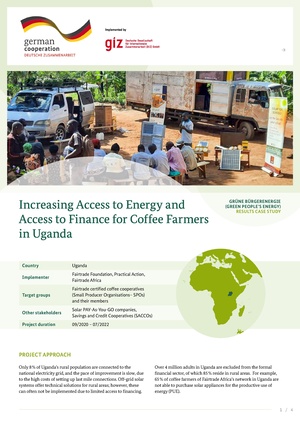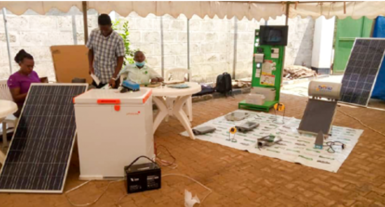Increasing Access to Energy and Access to Finance for Coffee Farmers in Uganda
Increasing Access to Energy and Access to Finance for Coffee Farmers in Uganda
Project Approach
Only 8 % of Uganda’s rural population are connected to the national electricity grid, and the pace of improvement is slow, due to the high costs of setting up last mile connections. Off-grid solar systems offer technical solutions for rural areas; however, these can often not be implemented due to limited access to financing. Over 4 million adults in Uganda are excluded from the formal financial sector, of which 85 % reside in rural areas. For example, 65 % of coffee farmers of Fairtrade Africa’s network in Uganda are not able to purchase solar appliances for the productive use of energy (PUE).To enable more members of coffee cooperatives in Uganda to access finance for solar PUE appliances, the project facilitates the development of microfinance products tailored to the needs and financial capabilities of the coffee farmers. To this end, the project works together with three farmer cooperatives, so-called small producer organizations (SPOs). These are organizing the sales of agricultural products, but also manage their own Savings and Credit Cooperative Organizations (SACCOs). These financial organisations have the purpose of saving money together and lending it to one another at predetermined interest rates, tenors, and conditions for specific purposes. The project advises SACCOs on understanding and lending for solar technologies (e.g. through road shows) and links them up with suppliers of high-quality solar appliances.
In sum, it helps solar companies to establish Pay-As-You-Go (PAYGO) financing solutions through the SACCOs. Solar systems are very costly compared to the daily income of the typical resident in an off-grid area, who often have no bank account and no access to financing. The PAYGO financing models have been developed to accommodate that – they require a low downpayment (e.g. 15 %), and then monthly instalments over 1- 2 years. But even when farmers can afford the down payment they are typically more able to pay after the harvest than during other periods and continuous monthly payments are challenging in such a situation. On the other hand, for the PAYGO companies, the distribution of solar systems in rural areas is expensive due to the dispersed customer base and risky because of high rates of customer default. The SACCOs in this project provide a means of aggregating demand and reducing the risk of customer default for the PAYGO companies. In this model the farmer orders the solar system through the SACCO who complies to the PAYGO term of the solar company and provides the farmer with loan terms that he or she can serve. The credit scheme is adjusted to his or her ability to pay, for example, timed with the coffee harvest and the resulting revenues. It can be flexible in terms of the credit amount itself as well as the terms of the loan. In case of emergency, the borrower can postpone the next loan instalment and continue paying later or use the so-called “check-off system” allowing the SACCO to withhold revenues from coffee sales to satisfy the loan payments. Simple speaking, the terms are tailored to the farmers’ needs and ability to pay. They also vary between the participating SACCOs. The solar companies, on the other hand, are regularly paid through the SACCO and thus their risk is minimized. The SACCO can afford this as it is collaborating with the SPO on the marketing of the coffee and therefore has access to income from production and export of coffee. Therefore, repayments can be guaranteed by the SACCO and defaults are reduced.The project’s activities are complemented by training of loan officers and accountants in the SPOs and SACCOs to understand the structure of the loans and manage new loans, delinquency tolerance and enforcement. In addition, the SPOs are training solar sales agents from their membership in order to speed up the adoption of solar products, and after-sales service agents. Both groups intentionally include men, women and youth.
Methodology of Data Collection
The data for this case study report was collected through a project document review and five qualitative interviews with representatives of GIZ, Fairtrade Foundation and Fairtrade Africa, as well as two solar PAYGO companies. The case study was conducted between April and May 2023. At that time, some project activities were still ongoing. Accordingly, the effects captured are not exhaustive.
Key Findings
Project Achievements
The approach of working within existing agribusiness structures has established a solid sales mechanism that will last beyond the projects’ lifetime and is easily scalable. Financially speaking, the cooperatives serve as a guarantor and risk mitigation mechanism for the solar companies, but also as a marketing channel that lowers the last-mile distribution costs. In the standard PAYGO business models, defaults are as high as 15 %, but here close to 0. Therefore, if the solar companies give a 10 % rebate to the cooperatives, is still a better business for them than on the “free” market. The project linked 12 SACCOs and five providers of off-grid solar appliances and already sold 79 solar products during the lifetime of the project, establishing access to energy for 40 male farmers and 39 female farmers and their families. Each of the 12 SACCOs has created a solar loan product with terms tailored to their membership’s ability to pay and making it available for all their members. As a result, 71 solar loans were disbursed by the SACCOs to their members.
Intermediate Impact
There are a number of impacts beyond the direct outputs resulting from the project: Firstly, the project stimulated demand for larger Solar Home Systems (SHS). The use of SHS has reduced the use of paraffin and kerosene lamps for lighting, which in turn has reduced smoke within residential houses, ultimately reducing associated health issues. Furthermore, the positive effect on the environment and climate should be mentioned, as less pollutants and CO2 are emitted due to the introduction of solar devices. Farmers also report feeling safer being able to light their farms and houses throughout the night. They also can leave out coffee to dry without fear of theft.
Solar companies also benefit from the project, allowing them to expand their business activities through a risk-reduced and institutionalised route, which has been tested in this project. To cite one of Fairtrade’s representatives, “testing is a big process” that will enable future upscaling of successful approaches. While the number of direct sales seems small, the total reach of the project is large – almost 3,000 farmers were participating in personal events, out of more than 14,000 members of the three participating SPOs. Last but not least, the final report of the project states: “solar home systems have allowed [the farmers] to access more information through TV, even information concerning farming, improving their skills.”
Challenges in Project Implementation
Solar appliances had a poor reputation before the project start since some stakeholders had previously made negative experiences with low quality products.Time was a limiting factor for the project management, as complex transactional procedures can slow down the realization of the planned activities. Overall, the project was scheduled to be implemented within one year, which proved to be impossible, as some of the SPO structures are habitually slow in decision making and implementing new structures. Last but not least, the project intentionally included women in the training of solar (loan) experts but reached a female participation of only 15 %. A factor costing time was the COVID 19 pandemic. It has led to a disruption of some planned activities. For instance, road shows to demonstrate the functioning of the solar devices in remote areas of the project region had to be postponed, and some trainings started very late.
While the model looks intuitively convincing, it is difficult to make it work. The last progress report showed that by the end of February 2022, more than 160 applications for solar products had been received but not fully approved.
Lessons Learned
The following factors contributed to the successful implementation of the project: Firstly, reducing scepticism towards new technologies through awareness-raising and demonstration is key for the successful promotion of solar PUE appliances. The GBE-project implemented extensive demonstration events like road shows and technology awareness campaigns, to convince the communities by “seeing and believing”. Furthermore, it broadcasted radio talk shows on solar technology on local stations.Secondly, trust for cooperation is built up by building on stable structures and organisations to create a secure setting for the project realization. Trust is crucial for the successful implementation and in this case, the local stakeholders have known Fairtrade due to former collaborations. Therefore, they relied on the partner with no prejudices. “Co-creation of the financing approach is grounded on the trust between the participating stakeholders,” as cited by a Fairtrade Foundation representative.
Thirdly, the process of „co-creation“ of the financing scheme itself is a further major success factor. As it was developed in cooperation with the cooperatives, it was possible to tailor it to the farmers needs and financial capabilities, thereby contributing to its acceptance and ownership by SACCOs and their members. Even between the participating SACCOs, these terms differed slightly, leading to the lesson that a significant local adjustment is a factor for success.
Sustainability of the Intervention
Due to their participation in the creation of the financing approach (“co-creation”), the SPOs and SACCOs have a strong interest in the continuation of the financing of access to solar products. Demand has been higher than could be satisfied during the project period, and financial sustainability is high. The financing scheme is market-based and no subsidies are paid. The SACCOs do not hand the full rebate that they receive from the PAYGO companies down to the farmer which creates an economic interest with them. The PAYGO companies also have significantly reduced distribution costs as they are mostly satisfying bulk purchases. It is worth mentioning that the SPOs are all members of the Fairtrade system, meaning that they observe other sustainability standards like minimum compensation levels and farmers receive better prices than on the global commodity market. To ensure the continued functioning of the solar appliances, awareness raising and capacity building on the granted warranty for the solar systems, repair and maintenance were incorporated into the project. Training local SPO members helps provide local jobs and reduce the wait time in case of malfunctioning.
Conclusion and Outlook
The GBE-project has introduced an effective financing approach tailored to the needs of the users whilst avoiding the need for subsidies and reducing risks for the solar supplier companies. Key elements are the creation of trust through connecting solar companies and coffee farmers through SPOs as well as the process of co-creation of the financing scheme, adjusting it to locationspecific needs and habits as well as the financial capacity of the SACCOs.
The chosen approach serves as a model for similar projects for setting up successful stakeholder cooperation. It will serve for providing loans sustainably for the purchase of solar appliances, including productive use appliances for the agricultural sector. Fairtrade Foundation and Fairtrade Africa are already implementing a scale-up project called Inclusive Energy Fund potentially benefitting 90,000 Fairtrade farmers and workers in Uganda, Tanzania, and Rwanda, with other SPOs and SACCOs in their network. There is significant potential for transferring the project approach to other regions and SPOs, as well as to agricultural producers of different crops. Most cash crops and the associated value chains are suited to generate a sufficiently steady income for the producer organisations so that guarantee mechanisms can be implemented through the agricultural cooperatives. An amendment of the successful approach to non-export agricultural products is also conceivable so that the productive use of energy is not limited to farmers with export-oriented production.























